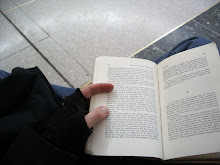Higher Learning, the Hard Way
Perhaps I should attune myself to the happenings on campus and not act so dead to it, for York University seems to be a hotbed of hatred. Behold:
12/3: Three students beaten and robbed in separate but related incidents
1/11: Female attacked in Founders College, marking the fifth sexual assault on campus this school year
1/13: Student Centre employee assaulted with a weapon
1/22: Racist graffiti found on door of Black Students Association office
Talk of the merits of closed-circuit televison and increased presence of law enforcement seems to be the customary response - I'd go so far as to say perfunctory. Have these proven to be deterrents of criminal behaviour? I don't know if a controlled study is possible to arrive at a desired scientific answer: the powers-that-be will say "yes", but, at least from what I've noticed, history will say "no".
The story of the sexual assault in Founders College provided yet another tragic reminder of Man's need to dominate Woman. If you're of the male sex, you might be thinking, "I'm a man, and I wouldn't dare rape any woman!" That may be so, my friend, but ask yourself how many times you've denigrated a woman - any woman, whether on television or in plain view - either out of personal belief or to reinforce your "manliness" before your macho male friends. What does this have to do with a series of sexual assaults at York University, or rape in general? Everything. No security camera or armed officer of the law is going to change our collective attitude about our female counterparts. In the wake of the Vanier assaults in September, I wanted to ask the armed guard who sat outside the residence if s/he would be effective in apprehending the rapists who dwell within (my cowardice prevented me from doing so).
Again, it can be said that no security camera or armed officer of the law will succeed in altering one's bigoted perspective, or need to beat another into a pulp and rob her/him. I'm reminded of a chat I had with a self-professed Socialist who desired to create a world in which one feared committing racist acts, and if he had to take a baseball bat to a few skulls, so be it. I proceeded to ask if this form of action would rid our society of racism, or simply punish racists, thus leading me to the point I'm reiterating for the umpteenth time: it seems we're more interested in apprehending criminals than in ending crime. Forgive me for the repetition, but I cannot stress this enough.
Having said all this, do I have the solution to the problem connecting these incidents? Hardly: I'm still trying to make sense of it all. Am I wasting my time in doing this? Do we need swift action to protect ourselves? From whom are we protecting ourselves? Some bogeymen with an insatiable desire to disrupt our peaceful, law-abiding society? The way I see it, these laws and cameras and cops intended to serve as some sort of security blanket, these layers of "protection" we install to protect us from ourselves. We don't want to believe we can just as easily be thieves or rapists or racists or murderers. We demand swift action to protect us from these "miscreants", yet beg for mercy when we find ourselves under said moniker.
God made us all, even the purveyors of "evil". Sheltering ourselves from the truth may succeed in punishing evil-doers, but will do nothing to rid the world of said evil: for every one person we incarcerate, several are lining up to take his/her place.


